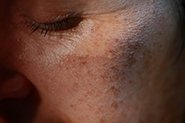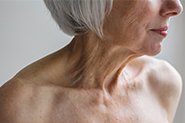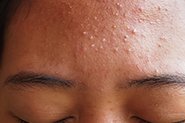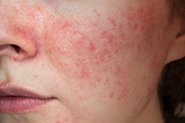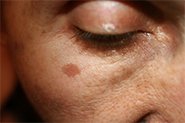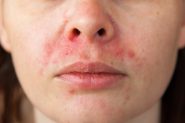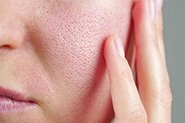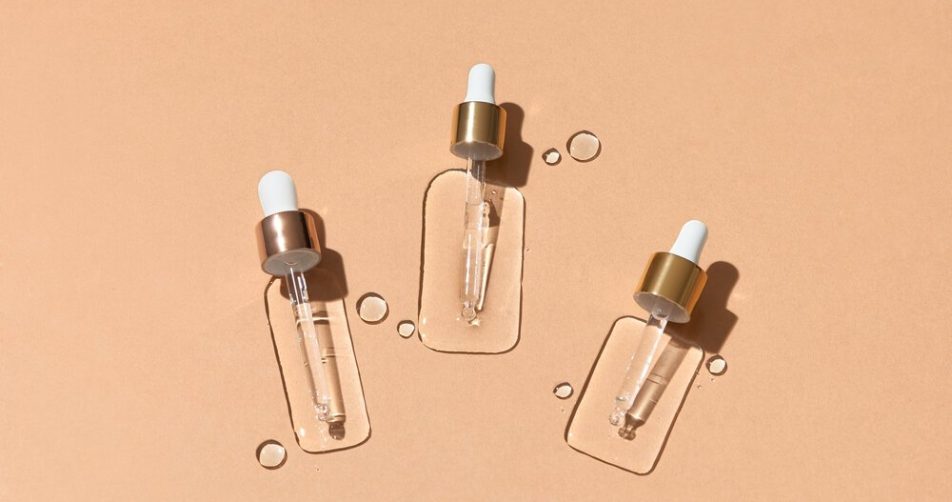
What’s the relationship between oestrogen and skin?
When it comes to human skin, oestrogen (which is actually a group of hormones, referred to collectively as ‘oestrogens’) plays a big part in skin health.
Oestrogen has a wide range of beneficial/protective roles in skin. It binds to specialised receptors in skin to:
Stimulate skin cell proliferation (the formation of new fresh skin cells from stem cells)
Increase hyaluronic acid and collagen synthesis
Promote wound healing and healthy skin barrier function
Protect from photoaging by acting as natural antioxidants (‘photoaging’ is the rough, dry, deeply wrinkled, saggy skin with uneven texture and tone that results from chronic sun exposure – more about that here)
Prevent wrinkle formation and skin dryness in post-menopausal women when used as HRT
Not skin specific – but oestrogen also stimulates the hair follicle for hair growth
How does skin change as women approach perimenopause and menopause?
As women approach perimenopause, reduced (and then after menopause, absence of) circulating oestrogen means there is less of it to bind skin receptors, leading to changes in the skin’s function and appearance. These changes are more obvious in facial skin as cells in this area has more oestrogen receptors than other areas of the body.⠀
These changes are:
Dry skin
The skin’s ability to hold moisture reduces, leading to loss of it’s healthy skin barrier function and increased susceptibility to allergic or irritant contact dermatitis reactions. This means more sensitive skin. For younger gals – there is evidence that skin is more sensitive around period time, possibly as a result of lower oestrogen in this phase of the menstrual cycle.
⠀
Fragile skin
The skin’s wound healing function is reduced so older skin is less able to repair itself – so resurfacing and rejuvenation treatments like exfoliation, dermabrasion, and dermaplaning should be performed with great care and by a professional who understands mature skin.⠀
⠀
Dull skin
The skin cells slow down. This reduction in epidermal skin cell proliferation and turnover can mean your skin has a less youthful ‘glow’⠀
⠀
Skin laxity & sagging
30% of your skin’s collagen content is lost in the first 5 postmenopausal years, with an average decline of 2% per year over a period of 15 years. There are also degenerative changes in the skin’s elastic fibres, making skin less plump and ‘bouncy’
If you’ve hit your 30’s, don’t think you’re out of the woods: oestrogen levels peak in your mid- to late 20s and slowly decline to 50% by age 50, then bottom out post-menopause . Combine this with the fact that the sun’s UV radiation upregulates hormones in the skin that break down collagen and elastin, contributing to deeper wrinkles and saggy skin. A 2018 study showed Australian women reported deeper facial lines and enhanced volume loss in tear troughs and nasolabial folds than women from Canada, the UK and USA. Australian women also reported moderate to severe signs of ageing 10-20 years earlier than their US counterparts. The early signs of sun damage are also apparent in Australian teens as young as 13 years of age.
So from a prevention perspective, it’s never too soon to start thinking about protecting your skin from the sun and preventing collagen loss!
What’s the best treatment and skincare for skin around menopause?
Firstly – think about supplementing your hormones with hormone replacement therapy
Hormone replacement therapy can reverse many of the skin issues associated with hormonal ageing. There are a lot of myths and misinformation about HRT, but many of these have been disproved by scientific studies, so it’s definitely something to discuss with your doctor.
Then, think about your basic skincare routine
The best skincare products for mature skin are simple and gentle to nourish dry, fragile skin, and reduce your chances of having a reaction. These include: a gentle, fragrance-free cleanser and moisturiser that respects and improves the skin barrier without irritation, and vigilant sun protection. The La Roche-Posay Toleriane range is specifically designed with minimal ingredients for sensitive skin, and comes at a great price point, but there are many other alternatives. If you are a Qr8 MediSkin patient, our Skincare Support Team will help you choose the best skincare products for you.
And forget about drinking water to improve dry skin – drinking water (even above and beyond your body’s thirst signals) does nothing for skin. But it will make you wee more!
Add in anti-aging skincare ingredients
Prescription-strength retinoids are the only evidence-based anti-aging topical ingredient that can stimulate skin cell proliferation, increase HA, elastin & collagen synthesis, promote changes in the skin that help with wound healing and repair of sun damage, and prevent wrinkle formation. So, no matter the cause, anyone concerned with aging skin should be thinking of adding this gold standard ingredient to their routine.
When your skin is accustomed to regular use of retinoids (aim for daily use of the highest strength your skin can tolerate – this differs between people, and our Skincare Support Team will help you reach this target as quickly and safely as possible), you can then add in other minor players like vitamin C (in the form of L-ascorbic acid) and low-strength AHAs.
Finally, consider a collagen supplement
There is also sound scientific evidence that low molecular weight collagen peptide supplements stimulate increased collagen, elastin and hyaluronic acid production in the skin, plumping out wrinkles and increasing the skin’s hydration and elasticity levels in the process. So this is another great supporting and preventative option for oestrogen-deficient, or aging, skin.
The beauty industry is (finally!) paying lot of interest in women in their 40s and beyond. Why is this?
We’re a market that has been largely ignored by the beauty and advertising industries! But Australia has more women (the largest consumer of skincare products) aged 45 or older than under 30. Our over 50s market holds 50 per cent of Australia’s private wealth, and 46 per cent of disposable income. Women aged 55+ are the largest consumer demographic in multibrand beauty stores (e-commerce and stand-alone) worldwide. This represents a growing, well-informed, cashed-up market (who are largely ignored by beauty industry advertising!). They want intelligent, high-performance, age management solutions. Beauty has become a serious business in this market – it is shaking off the shackles of superficiality and becoming an essential component of emotional and mental health as we strive for longevity and quality of life.
Oh, and by 2025 there will be 1 billion women in menopause worldwide (that’s 12% of the entire world’s population). Given that menopause can last anywhere from 10-30 years, that’s an awful lot of women suffering with the skin function issues that accompany declining hormone levels!
READY TO GET STARTED WITH PRESCRIPTION RETINOID TREATMENT?
CLICK HERE TO BOOK A CONSULT WITH OUR EXPERIENCED MEDICAL TEAM.
REFERENCES
1. Nikolakis G, Stratakis CA, et al. Skin steroidogenesis in health and disease. Rev Endocr Metab Disord. 2016. PMID: 27761789.
2. Lephart ED. A review of the role of estrogen in dermal aging and facial attractiveness in women. J Cosmet Dermatol. 2018. PMID: 29436770.
3. Thornton MJ. Estrogens and aging skin. Dermatoendocrinol. 2013. PMID: 24194966.
4. Bayerl C. Topical hormonal treatment in anti-aging of the skin]. Hautarzt. 2020. PMID: 32852599.
5. Mukherjee S, Date A, et al. Retinoids in the treatment of skin aging: an overview of clinical efficacy and safety. Clin Interv Aging. 2006. PMID: 18046911.
6. Goodman GJ, Armour KS, et al. Comparison of self-reported signs of facial ageing among Caucasian women in Australia versus those in the USA, the UK and Canada. Australas J Dermatol. 2018. PMID: 28397327.
7. de Miranda RB, Weimer P, et al. Effects of hydrolyzed collagen supplementation on skin aging: a systematic review and meta-analysis. Int J Dermatol. PMID: 33742704.


